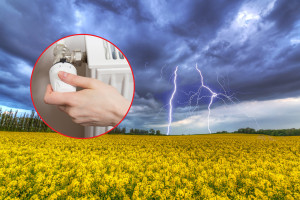80% of women have this symptom. Only a quarter of them get help

They reminded us that non-hormonal drugs that alleviate vasomotor symptoms (VMS) have recently appeared. They are a good alternative for women who cannot or do not want to use hormone replacement therapy.
Gynecologist and sexologist Dr. Karina Barszczewska reminded during the meeting that menopause means exactly the last menstrual period in a woman's life. Many symptoms related to the menopausal transformation (the so-called perimenopausal period), including the so-called vasomotor symptoms, appear 5-7 years before the last monthly bleeding.
- Vasomotor symptoms include hot flashes and night sweats. They affect as many as 80 percent of women during menopause - said the specialist.
Scientific studies indicate that one-quarter of women experiencing vasomotor symptoms describe them as severe. In one-third of women, these symptoms persist for seven years or longer (in 10% for 10-15 years). As many as 82% of postmenopausal women assess that they negatively affect the quality of their sleep.
- In extreme cases, women may experience 10-15 episodes of hot flashes or wake up every hour at night due to sweating - emphasized Dr. Barszczewska.
Most women experience 33 such episodes a week.
The specialist noted that the intensity of vasomotor symptoms in the perimenopausal period depends on many factors, including lifestyle - smoking, obesity, susceptibility to stress, the occurrence of depression and anxiety.
Importantly, research indicates that the more vasomotor symptoms a woman experiences, the higher her risk of developing cardiovascular disease , especially hypertension, which in turn increases the risk of heart attack, stroke, and dementia.
As Dr. Barszczewska explained, vasomotor symptoms appear during menopause due to a decrease in the production of the female sex hormone – estrogen – in the ovaries.
- There is no tissue in our body whose cells do not have estrogen receptors. Therefore, due to the decrease in estrogen concentration, the functioning of the brain, heart, kidneys, and bone metabolism changes - the specialist listed.
Estrogen also regulates the work of the thermoregulation center, located in the brain - in the hypothalamus. When this hormone is missing, this center (referred to as the internal thermostat) begins to function incorrectly and sends false signals that the body is overheating and needs to be cooled down. To do this, blood vessels dilate, skin redness and a feeling of heat appear, and as a consequence, profuse sweating occurs.
According to Dr. Barszczewska, only one in four women with vasomotor symptoms receives help to alleviate these symptoms . One reason is that many women, especially those from smaller towns, still do not seek help because they are convinced that hot flashes during menopause are an inherent part of being a woman.
According to gynecologist Dr Agnieszka Nalewczyńska, women also receive information from doctors that as long as symptoms related to menopause do not bother them, they do not need to seek help.
The expert pointed out that in addition to vasomotor symptoms, these may also include symptoms such as: migraines, mood disorders, so-called brain fog, i.e. difficulties with concentration and memory, dry mouth, vaginal dryness, joint pain, tinnitus, and balance disorders.
- In England, it has been verified that before a woman finds out that her symptoms are related to menopause, she can visit up to 10 doctors - said the specialist.
According to a study conducted by IPSOS on behalf of the Kulczyk Foundation among Polish women aged 40-55 (report entitled "Invisible at work. Women in the perimenopausal period"), as many as 42% of them considered limiting or ending their professional activity due to troublesome perimenopausal symptoms .
Dr. Nalewczyńska emphasized that the basic way to help women during menopause is hormone replacement therapy (HRT). However, due to the persistent fear of developing breast cancer, women do not want to use it.
- Meanwhile, we currently know that the risk is no greater than that associated with, for example, drinking one alcoholic drink a day - said the gynecologist.
The only women who cannot use HRT are those who have already had breast cancer or another hormone-dependent cancer, or who have thromboembolic diseases.
For these women, as well as for women who do not want to take HRT, new non-hormonal therapies have emerged that alleviate vasomotor symptoms. These drugs block neurokinin B receptors in the brain, thereby reducing the number and severity of hot flashes and night sweats.
- This therapy practically eliminates hot flashes and has a convenient dosage - one tablet a day is used - said Dr. Nalewczyńska.
Dr. Barszczewska noted that the period after menopause accounts for one third of a woman's life.
- That is why it is worth being more gentle with yourself and taking care of a better quality of life, healthier sleep, diet, physical and sexual activity - concluded the specialist.
The conference was held as part of the educational campaign "We and menopause", organized by the Health Without Taboo Foundation of Agata Młynarska and Astellas Pharma.
Copyrighted material - reprint rules are specified in the regulations .
rynekzdrowia









